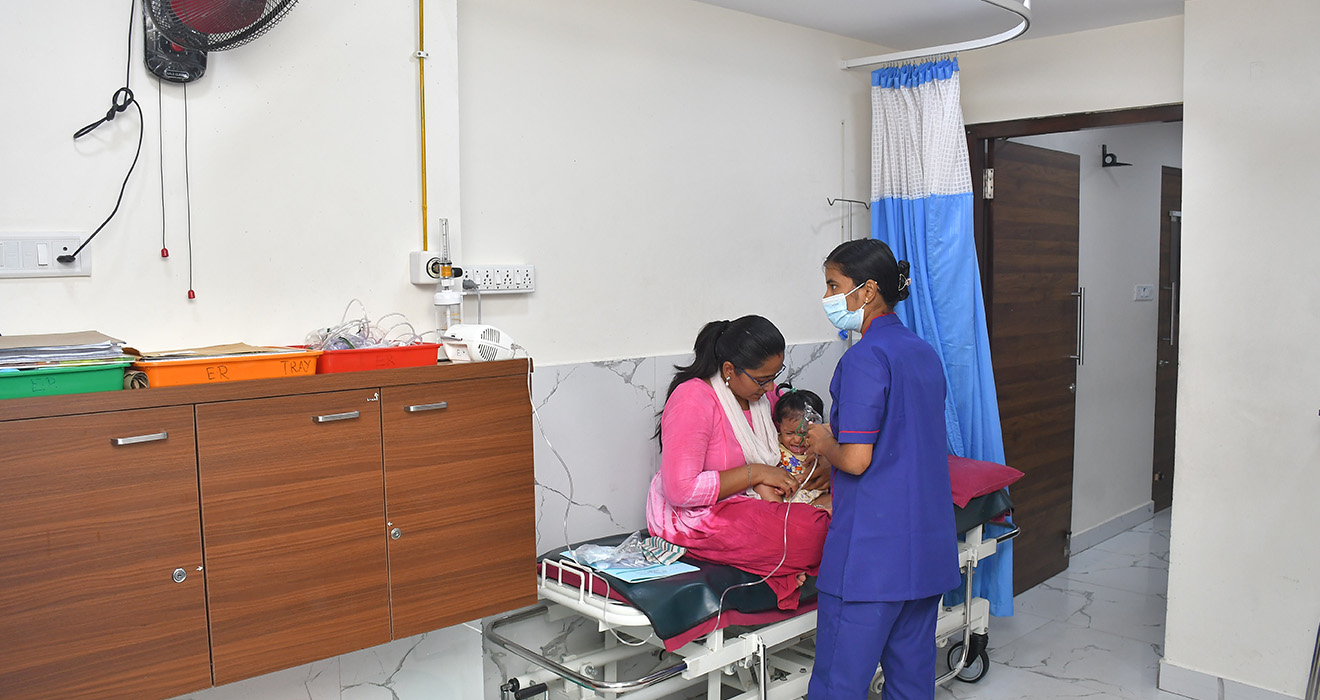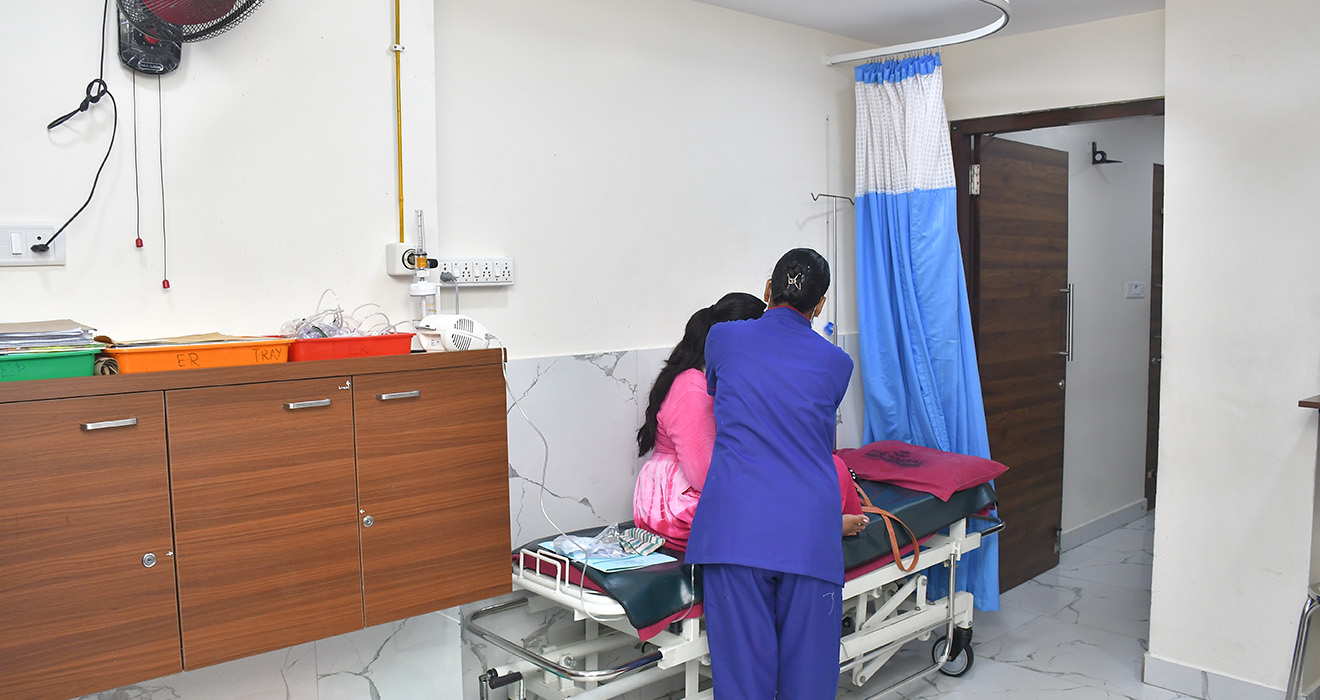Obstetrics & Gynaecology Department
Obstetrics and gynecology (OB/GYN) is a combined medical specialty that deals with the female reproductive system. Obstetrics focuses on pregnancy, childbirth, and the postpartum period, while gynecology focuses on the health of the female reproductive system, including the diagnosis and treatment of disorders and diseases.



Obstetrics:
- Prenatal Care: Monitoring the health of the mother and fetus during pregnancy, including routine check-ups, ultrasounds, and genetic testing.
- Labor and Delivery: Managing childbirth, including normal deliveries and complications such as preterm labor, breech births, and cesarean sections.
- Postpartum Care: Providing care to the mother following childbirth, including monitoring recovery and addressing any complications.
- High-Risk Pregnancy Management: Specialized care for pregnancies with increased risk due to factors such as maternal age, pre-existing health conditions, or multiple pregnancies.
Gynecology:
- Routine Care and Screenings: Annual exams, Pap smears, HPV testing, and breast exams.
- Reproductive Health: Management of menstrual disorders, contraception, and family planning.
- Pelvic Pain and Endometriosis: Diagnosis and treatment of chronic pelvic pain and endometriosis.
- Menopause Management: Treatment of symptoms associated with menopause, including hormone replacement therapy.
- Gynecologic Oncology: Diagnosis and treatment of cancers of the female reproductive system, including ovarian, uterine, and cervical cancers.
- Pelvic Floor Disorders: Treatment of urinary incontinence, pelvic organ prolapse, and other pelvic floor issues.
- Sexually Transmitted Infections (STIs): Diagnosis, treatment, and prevention of STIs.
- Ultrasound: Imaging to monitor pregnancy and diagnose gynecological conditions.
- Colposcopy: Examination of the cervix, vagina, and vulva using a colposcope to identify abnormal cells.
- Laparoscopy: Minimally invasive surgery to diagnose and treat conditions like endometriosis, ovarian cysts, and ectopic pregnancy.
- Hysteroscopy: Inspection of the uterine cavity using a hysteroscope to diagnose and treat uterine conditions.
- Dilation and Curettage (D&C): Procedure to remove tissue from inside the uterus, often performed after a miscarriage or to diagnose uterine conditions.
- Cesarean Section (C-Section): Surgical delivery of a baby through an incision in the mother’s abdomen and uterus.
- Hysterectomy: Surgical removal of the uterus, which may be performed for various medical reasons, including cancer or severe fibroids.
Patient Care:
- Providing comprehensive care to women of all ages, including preventive care, diagnosis, and treatment of reproductive health issues.
- Offering guidance and treatment for family planning and contraception.
- Managing pregnancy, labor, and delivery, including both normal and high-risk pregnancies.
Surgical Care:
- Performing surgeries related to the female reproductive system, including minimally invasive procedures and major surgeries like hysterectomy and cesarean sections.
- Managing postoperative care and follow-up.
Education and Counseling:
- Educating patients on reproductive health, prenatal care, and preventive measures.
- Providing counseling for family planning, infertility, and menopause.
Collaboration:
- Working with other healthcare providers, including primary care physicians, pediatricians, and specialists, to provide comprehensive care.
- Coordinating care for high-risk pregnancies and complex gynecological conditions.
- Regular Screenings: Encouraging routine gynecological exams, Pap smears, and mammograms to detect issues early.
- Healthy Lifestyle: Promoting a healthy diet, regular exercise, and avoidance of smoking and excessive alcohol consumption.
- Vaccinations: Recommending vaccines like HPV to prevent certain types of cancers.
- Safe Pregnancy Practices: Advising on prenatal vitamins, avoiding harmful substances, and regular prenatal check-ups.
- Menopause Management: Educating on symptom management and health maintenance during menopause.
- Medical School: Completion of a Doctor of Medicine (MD) or Doctor of Osteopathy (DO) degree.
- Residency: A 4-year residency in obstetrics and gynecology, which includes training in both obstetrics and gynecology.
- Fellowship (Optional): Additional specialized training in areas such as maternal-fetal medicine, reproductive endocrinology and infertility, gynecologic oncology, or urogynecology.
- Maternal-Fetal Medicine (MFM): Focuses on high-risk pregnancies and fetal conditions.
- Reproductive Endocrinology and Infertility (REI): Deals with infertility and hormonal disorders.
- Gynecologic Oncology: Specializes in cancers of the female reproductive system.
- Urogynecology: Focuses on pelvic floor disorders, including urinary incontinence and pelvic organ prolapse.
OB/GYN specialists play a vital role in the health and well-being of women, providing essential care throughout their reproductive lives and beyond. They manage a wide range of conditions and procedures, offering both medical and surgical treatments to ensure comprehensive care for their patients.
Oncology Specialist
An oncology specialist, commonly known as an oncologist, is a physician who specializes in the diagnosis, treatment, and management of cancer. Oncologists work closely with patients throughout their cancer journey, from diagnosis to treatment and follow-up care.

